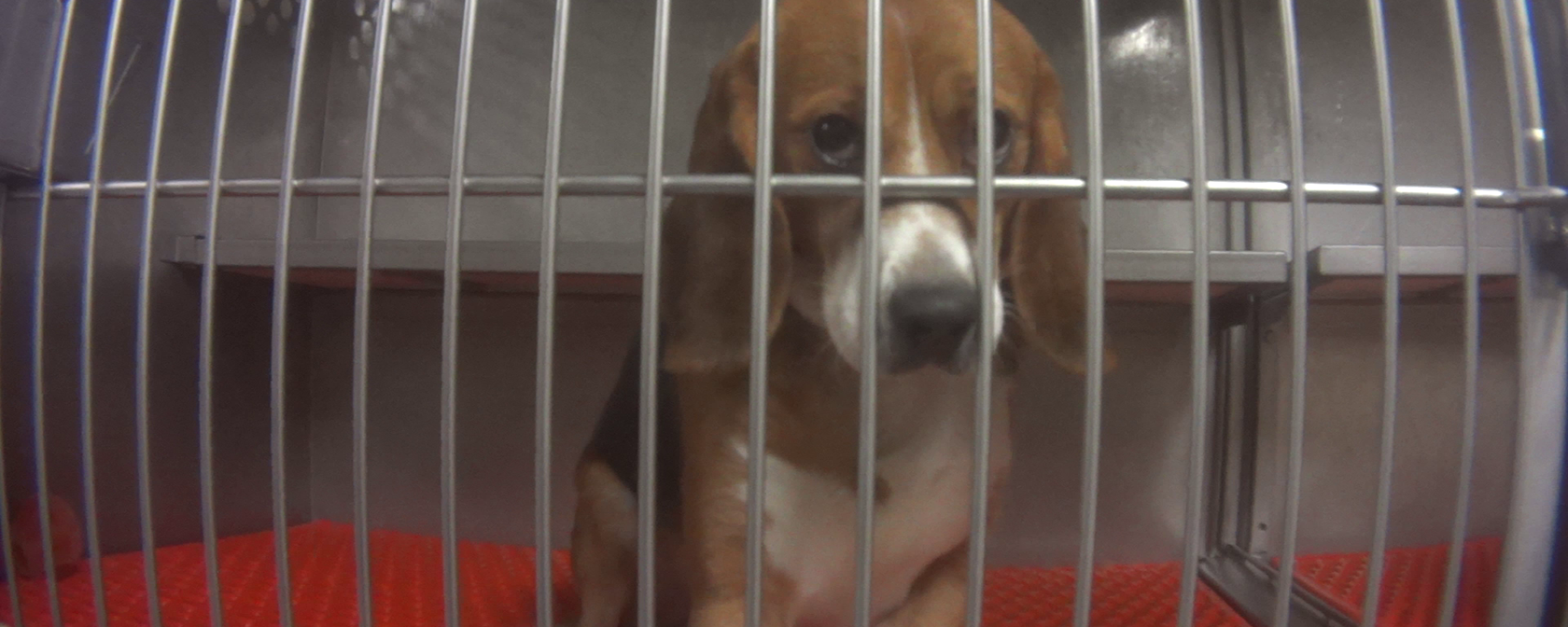By Sara Amundson and Kitty Block
The U.S. government is spending millions of taxpayer dollars to fund experiments on dogs, a new report we are releasing today shows.
It is estimated that there are more than 58,000 dogs being used in U.S. public, private and federal research and testing facilities each year. Some of these dogs—an average of 660 each year—are deliberately not given any drugs or any other help to relieve their pain and distress.
Our researchers scrutinized projects funded by the federal National Institutes of Health that used dogs. They also evaluated the likely experience of these dogs and estimated the ultimate impact of the research.
We found that between 2015 and 2019, the NIH awarded more than $200 million to 200 individual institutions for 303 separate projects using dogs as experimental models. The dogs in these projects may have been subjected to multiple surgeries, fitted with equipment to impair their heart function, or implanted with devices to alter normal bodily functions. Following the conclusion of an experiment, the dogs are often killed so that their organs can be examined.
There are serious ethical and scientific problems associated with the use of dogs in animal research and testing. Decades ago, it was the animals’ size, availability, and the fact that they tend to be trusting and easy to handle that led to their use in laboratories. Today, with science having advanced by leaps and bounds, there is a plethora of scientific, non-animal testing methods available that can provide results that are faster, more accurate and relevant to humans, making dog tests in many cases unnecessary.
Despite this, however, and despite a growing distaste among Americans for animal testing, the number of dogs used in federally funded research or testing has not dropped appreciably over the past 20 years. With the release of this report, we are hoping to change that, and to move a number of federal agencies, including the Environmental Protection Agency, the Food and Drug Administration and the Department of Veterans Affairs, to reduce dog testing and move towards humane alternatives.
The Humane Society of the United States and Humane Society Legislative Fund have been advocating for years to end the use of dogs and other animals in biomedical research and testing. In 2019, we turned the spotlight on this issue with an undercover investigation that showed beagles being poisoned with pesticides and killed at an animal testing lab in Michigan. The outrage following our expose led to the experiment being canceled, and 32 beagles were released from the facility for placement in loving homes.
At our urging, in 2019, the EPA has made a commitment to end testing on dogs, mice, rabbits and other mammals by 2035. Additionally, the National Academies of Sciences, Engineering and Medicine issued a report on dog use in Department of Veterans Affairs’ laboratories which requested the agency reduce or eliminate the use of dogs and develop a roadmap to incorporate non-animal approaches into its biomedical research programs. And the FDA has announced it is investigating opportunities to eliminate dog use in some studies.
These actions are welcome but there is much more that our federal government can do. As part of the recommendations in our report, we are urging that the EPA recommit to its phaseout of all testing on mammals and that the FDA, NIH and the VA establish clear commitments and timelines for phasing out the use of animals in research and testing.
States can end the use of dogs in research and testing not required by federal law, and we are also urging state lawmakers in all 46 states, where such testing is carried out, to do so without delay. States should also pass laws that require dogs from research facilities be placed for adoption rather than being euthanized. Twelve states, including New York, California, Illinois and Maryland, have already passed such laws.
Your support has helped us win important battles against animal research and testing in the past, and we need it again. Please call on state and federal governments to end research and testing on dogs and invest in science that doesn’t cause animal suffering. Dogs used in toxicity testing and research lead miserable lives. They are confined to sterile steel cages, never feeling the grass under their feet or knowing what it is like to snuggle in a lap. This is no way to treat our best friends, and most Americans would not want their tax dollars to enable such terrible cruelty.
Kitty Block is President and CEO of the Humane Society of the United States.




